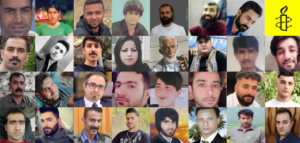
Amnesty International, April 4, 2024
Robust international action is urgently needed to halt a horrifying surge in executions that saw Iran’s prisons transformed into sites of mass killings in 2023, said Amnesty International. In a new research briefing published today the organization highlights that at least 481 executions – more than half of the total 853 executions recorded in 2023 – were carried out for drug-related offences.
“Don’t Let Them Kill Us”: Iran’s Relentless Execution Crisis since 2022 Uprising reveals how the Iranian authorities have intensified their use of the death penalty to instil fear among the population and tighten their grip on power in the aftermath of the “Woman Life Freedom” uprising of September-December 2022. The briefing also raises the alarm over the disproportionate impact of the authorities’ lethal anti-narcotics policies on poor and marginalized communities.
The number of executions in 2023 is the highest recorded since 2015 and marks a 48% increase from 2022 and a 172% increase from 2021. Iran’s killing spree is continuing into 2024, with at least 95 recorded executions by 20 March. Execution numbers recorded by Amnesty International are minimum figures and the organization believes the real number is higher.
“The death penalty is abhorrent in all circumstances but deploying it on a mass scale for drug-related offences after grossly unfair trials before Revolutionary Courts is a grotesque abuse of power. The Islamic Republic’s deadly anti-narcotics policies are contributing to a cycle of poverty and systemic injustice, and further entrenching discrimination against marginalized communities, in particular Iran’s oppressed Baluchi minority,” said Diana Eltahawy, Deputy Regional Director for the Middle East and North Africa at Amnesty International.
Last year also saw a wave of executions targeting protesters, social media users and other actual or perceived dissidents for acts protected under international human rights law incurring charges such as “insulting the prophet” and “apostasy” as well as vague charges of “enmity against God” (moharebeh) and/or “corruption on earth” (efsad-e fel arz).
Read More
 Iranian Youth Leaders Speak At Bipartisan Summit On Iran – March 9th, 2024
Iranian Youth Leaders Speak At Bipartisan Summit On Iran – March 9th, 2024
OIAC Donation | 501 (c)(3) Tax deductible
Your donation will help OIAC advocate for a democratic, secular and non-nuclear government in Iran. Founded on the respect for human rights, gender equality, religious and ethnic tolerance, as wells as social, economic justice, and security for America. Our goal is to organize Iranian-American communities in the United States to promote these values.

